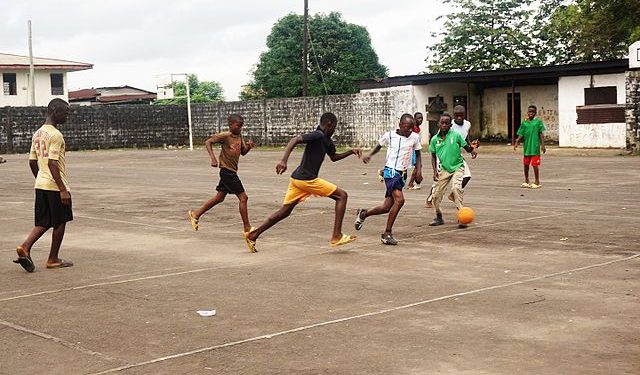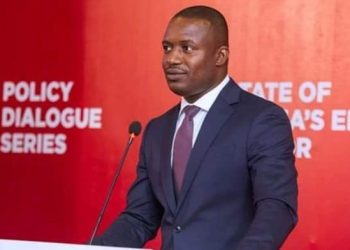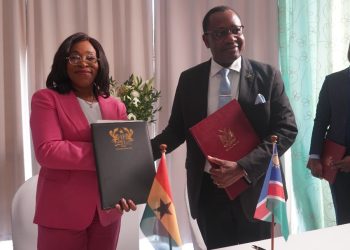When the Government of Ghana commits to scale-up play-based learning in primary schools, there will be a measurable and significant improvement in the learning outcome of Ghanaian girls and boys. Play-based learning pedagogy is a scientifically vetted, verified and approved teaching and learning tool that addresses holistic needs and supports the growth and development of children.
A play-based learning classroom environment is one that is first playful, gender-responsive (providing equitable opportunities for both girls and boys based on their needs), amplifies the voices of children, builds their self-confidence, brings children and teachers together as partners in the learning process, turns children into lifelong learners, creates lasting memories in their minds and hearts, and brings out the best in teachers.
Over the past years, there had been repeated demands to improve the quality of education in Ghana by introducing a system that prioritises the growth and development of Ghanaian girls and boys.
Several reforms were introduced in the past which entrenched the traditional teaching method practised in Ghanaian classrooms. Under this method based on the rote learning system, children learn through repetition and memorisation bereft of creativity and independent thinking.
However, the introduction of the ‘Standards-Based Curriculum’ (SBC) in 2019 for kindergarten to primary six marked a radical shift from the rote learning system anchored on the objective-based curriculum (OBC) to the modern approach to learning where the holistic development of children is at the centre of teaching and learning. The SBC is focused on building character, nurturing values, literacy, confidence, and critical thinking of children.
The new curriculum emphasises the use of games or play to deliver lessons in class. Although this may not be new to kindergarten or preschool teachers, the use of play or games in class may be new to many teachers in primary school. I must, however, note that there are some primary school teachers who are proficient in the use of play-based learning pedagogy thanks to the work of Right To Play Ghana which is presently operating in selected districts in the Greater Accra, Volta, and Northern regions.
The international development organisation is building the capacity of Ghanaian teachers and district education officials and providing relevant tools and resources, to support the incorporation of play in classroom activities.
There is, however, an urgent need to introduce other primary school teachers in Ghana to the methodology and I am confident that when this is done, it will eliminate any hiccups to the implementation of the SBC. If playful learning is not scaled-up, teachers will use the SBC to sustain the traditional teaching method that the new curriculum is seeking to eliminate, and this will undermine the progress made. The evidence of the impact of play-based learning in Ghanaian schools where teachers are using the methodology is clear, simple, credible, relevant and incontrovertible.
Scaling up play-based learning methodology should be the way to go, but I must confess that this will not be a straightforward task. It is suggested that without intentional, guided efforts to do this, it might take many years to get primary teachers in Ghana to use the methodology.
In their article published in America’s Educational Researcher titled ‘Scaling-up Exemplary Interventions,’ (McDonald et al., 2006) defined scale-up as the “practice of introducing proven interventions into new settings with the goal of producing similarly positive effects in a larger, more diverse population.” In other words, scale-up is simply adapting innovation for widespread and supported use. It is instructive to note that the objective of any attempt to scale up playful learning should be first to produce robust, effective, and replicable teaching that drives academic excellence among learners.
Researchers have identified several paths to scaling-up any intervention and these include, (a) vertical, (b) horizontal, (c) functional, and (d) spontaneous. Under the vertical path to scaling-up, interventions are institutionalised through structural changes, manifesting in policy direction, legal, or budgetary commitment to support and sustain the desired system change.
This is significantly different from the horizontal path to scaling-up where the geographic reach of an intervention is merely expanded through replication in other areas. The functional path to scaling-up also known as “diversification” or “grafting” on the other hand entails the addition of a new intervention or a new component to an existing model or practice.
When it comes to the spontaneous path to scaling-up, the interventions are merely taken up and implemented in other areas without guided or intentional efforts. While the terms “spread” and “scale-up” may be used interchangeably in some literature, it has been argued that the term “spread” refers to the adoption and replication with little modification of an intervention, whereas “scale-up” targets the system or infrastructure issues arising during full-scale implementation.
It is, therefore, suggested that for play-based learning methodology to witness a widescale use with the attendant structural changes, it must be scaled up.
Scaling-up play-based learning in Ghana will require a vertical path and this can be more successful when there is a clear political will on the part of the government, and budgetary commitment (this can only be done with the support of the Ministry of Education, Ministry of Finance, and Parliament particularly, the Parliamentary Select Committee on Education), pronounced and established policies, community readiness (this involves the readiness of teachers to use the methodology and district education officials to undertake monitoring exercises), reliable and consistent education supplies (resources such as textbooks, manuals, and teaching and learning materials be made available to both children and teachers) and the requisite infrastructure (playful learning requires space), to support the process with the assistance of credible local stakeholders.
Similarly, there will be the need for strong governance and leadership on the part of the Ministry of Education (MoE) and its agencies, including the Ghana Education Service (GES), National Council for Curriculum and Assessment (NaCCA), National School Inspectorate Authority (NaSIA), and the National Teaching Council (NTC), to support this effort. Again, the scale-up efforts will require ongoing monitoring, continuous quality improvement, and consistent evaluation. Not forgetting that teachers, headteachers, and education officials will need the skills and strategies to support the scale-up of playful learning.
There are four observable features that will stand out when the play-based learning pedagogy is scaled-up across Ghana namely, (a) widespread use of playful learning in Ghanaian classrooms, (b) deep changes in classroom practices, (c) a sense of ownership of the methodology, and (d) sustainability.
Although researchers (Deaton and Cartwright, 2017) have said that “Technical knowledge, though always worth having, requires suitable institutions if it is to do any good.” Like David Evans, Senior Fellow at the Center for Global Development, I believe part of getting the system running is by making the effort to invest and learn to work with the institutions that are already in place.
Playful learning may be a technical area requiring the assistance of experts; however, I am confident the institutions already in place in Ghana, with the support of reliable local networks, are competent and capable of implementing the scale-up of the pedagogy for the ultimate and express benefit of Ghanaian girls and boys.
Scaling-up playful learning will require more work from the government and reliable support, sometimes financial and largely technical, from local stakeholders to improve the quality of primary education in Ghana. The commitment of the stakeholders in education must be to support fully the scale-up of the play-based learning methodology in the country.
This should not be business as usual and the right time to act is now. Play-based learning is the present and future of Ghanaian education so, let’s embrace it.
==
The author, A. Kwabena Brakopowers is a development communications practitioner, author, and essayist who has written extensively on international relations, education, health and politics. He could be reached at brakomen@outlook.com.















